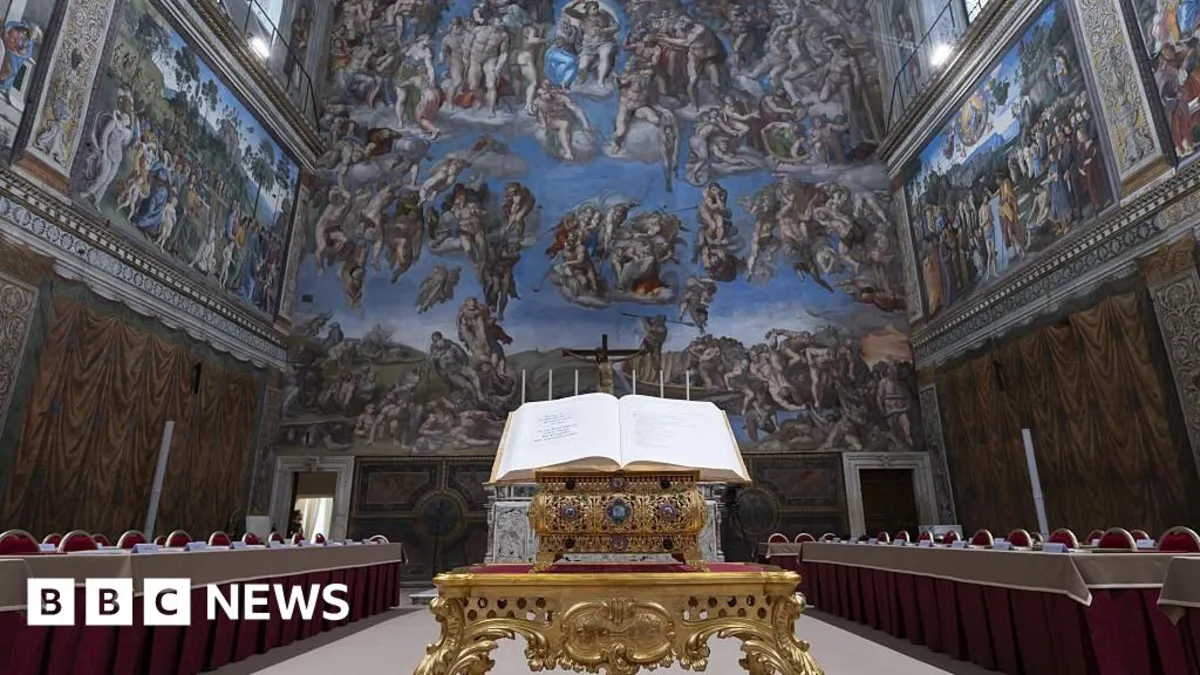
On Wednesday evening, the historic voting process to elect the Catholic Church's 267th pope will commence under the breathtaking domed ceiling of Michelangelo's Sistine Chapel. A total of 133 cardinals will gather to cast their votes, marking a significant moment in the Church's leadership. The day will begin promptly at 10:00 AM local time (09:00 BST) with a solemn mass held in St. Peter's Basilica.
The mass, which will be broadcasted for the world to witness, will be led by Cardinal Giovanni Battista Re, the 91-year-old Cardinal Dean. Notably, he also presided over the funeral of Pope Francis, adding emotional weight to the proceedings. Following the mass, preparations will escalate as the Vatican implements measures to ensure the privacy of the conclave.
In the early afternoon, mobile signals within the Vatican will be deactivated, ensuring that the cardinals remain cut off from the outside world during the election process. Around 16:15 (15:15 BST), the 133 cardinal electors will convene in the Pauline Chapel before proceeding to the Sistine Chapel, singing a litany and the hymn Veni Creator to invoke the guidance of the Holy Spirit as they deliberate on the next pope.
Upon entering the Sistine Chapel, the cardinals will place one hand on a copy of the Gospel and take an oath of secrecy, pledging never to disclose details about the election process. Following the swearing-in of all electors, a meditation will take place, after which the Master of Pontifical Liturgical Celebrations, Diego Ravelli, will announce extra omnes (everyone out). This declaration signifies the commencement of the conclave, marking the cardinals' official isolation.
The term "conclave," derived from the Latin cum clave meaning "with key," can be misleading. The cardinals are not physically locked inside; rather, the entrances to the Apostolic Palace, including the Sistine Chapel, have been sealed with lead seals by Vatican officials. Additionally, Swiss guards will monitor all entrances to ensure security and confidentiality.
Diego Ravelli will distribute ballot papers, and the cardinals will cast their votes shortly after. While it is technically possible for a pope to be elected in the first vote, this has not occurred in centuries. According to Austen Ivereigh, a prominent Catholic writer and commentator, the first ballot is particularly crucial as it helps gauge the support for various candidates. The cardinals will focus on those candidates who receive more than 20 votes, as this indicates momentum.
If the initial vote fails to achieve the two-thirds majority required to elect a new pope, the cardinals will return to the Casa Santa Marta guesthouse for dinner. It is during these informal gatherings that vital conversations take place, allowing for consensus to form around specific candidates. Italian media report that the menu will feature light dishes, typically served to guests, accompanied by wine but no spirits. The staff is also sworn to secrecy, remaining on the premises throughout the conclave.
Starting Thursday morning, cardinals will have breakfast between 06:30 (05:30 BST) and 07:30 (06:30 BST) before attending mass at 08:15 (07:15 BST). Two voting sessions will occur in the morning, followed by lunch and a period for rest. Pope Francis revealed in his memoirs that he began to sense support from fellow cardinals during these moments, leading to his election during the first afternoon vote. Recent conclaves have concluded by the end of the second day, but it remains uncertain whether this conclave will be brief or extended. The cardinals understand that prolonged proceedings could signal significant disagreements among them.
As the cardinals engage in discussions, prayers, and votes, thousands of faithful will eagerly await the announcement outside the boarded-up windows of the Sistine Chapel. They will look up at the chimney adjacent to St. Peter's Basilica, anticipating the white plume of smoke that will signal the election of the next pope, marking a new chapter in the Catholic Church's history.